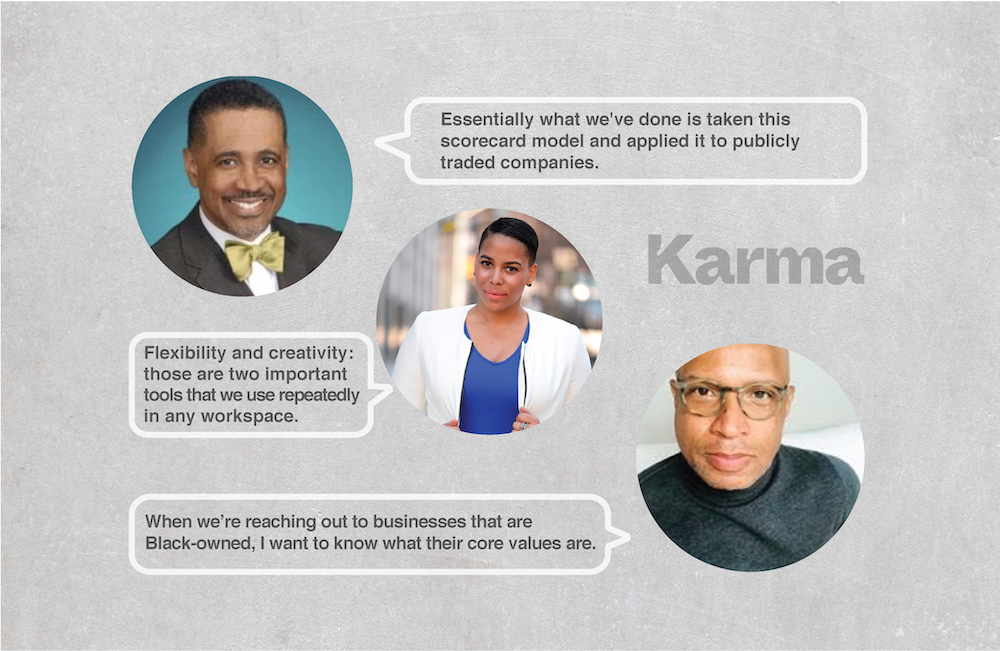George Floyd’s death while being arrested by Minneapolis police sparked a range of reactions from peaceful protests to property destruction, from individual soul-searching to countless discussions about racial inequality around the world — including among the impact investing community.
Karma spoke with black entrepreneurs and investors for their views on how impact investors might address the centuries-long American problem of racial injustice. Here’s what they said:
Taking Stock of Racial Equity: Marvin Owens, Senior Director of Corporate Relations at NAACP
Corporate finance shouldn’t be startled by the recent pressure to embrace racial equity. The NAACP has been doing industry scorecards on racial equity for the last 25 years, gathering data on metrics like the number of Black senior leaders and crunching the numbers into a letter grade for each company, which is then published.
“We use that letter grade as an opportunity for the NAACP to work with these corporations to improve their performance, and as an informational tool for our constituency,” said Marvin Owens, who leads this work for the civil rights organization.
A few years ago, the NAACP partnered with the nonprofit Impact Shares to take their rankings a step further. Impact Shares founder Ethan Powell launched the NACP ETF to track the Morningstar Minority Empowerment Index, which includes the top 200 performers across a variety of diversity and inclusion metrics. Impact Shares then donates all net advisory profits from the ETF management fee to the NAACP.
“Essentially what we’ve done is taken this scorecard model and applied it to publicly traded companies — and instead of using a survey in which we are, back and forth, trying to get data from a corporation, we work with Morningstar,” said Owens, who noted that iterative data-crunching is better than what used to be an annual process. “Now investors are really looking at, okay, how do we put our money to work, how do we make sure our capital is really contributing to dismantling systemic racism? The ETF has been a wonderful tool to accomplish that.”
Keeping the Door Open: Asha Tarry, community mental health advocate, coach, and psychotherapist
As companies make public statements in support of Black Lives Matter, many are struggling with what to change internally, and how to even begin.
“Flexibility and creativity: those are two important tools that we use repeatedly in any workspace,” said New York-based Asha Tarry, who works with both employees and employers on safe and equitable workplaces. “Employers being, and managers being, more flexible in terms of the ways they receive information. We need to be creative in terms of how ideas are presented and that might come from the team itself.”
Tarry, who is also a social justice activist, says she regularly works with clients of color who find their proposals or contributions dismissed, only to see their white colleagues get the benefit of the doubt — which then shuts down what could be valuable contributions. That dynamic, according to Tarry, often comes from fixed ideas about hierarchy.
“If you’re a white business owner and you’re working to create more equity in workspaces, I would be more investigative of the practices that you have created or have sustained,” said Tarry. “Are the policies within your company inclusive of people who do have different ideas that oftentimes get overlooked because they’re not the most noticeable employees, or maybe because they don’t have the backgrounds of the employees that tend to get those types of wins in an industry?”
Case in point: the idea of an “open door policy,” which Tarry says can too often be theoretical.
“It’s one thing to say, ‘you can go to the boss because it’s an open door policy’ — but not if that boss oftentimes is holed up in their office with their door closed on conference calls,” she pointed out, adding that the remote-work era opens up a great opportunity to reset communication norms.
Another key ingredient to building an equitable workplace? Vulnerability.
“It would mean a lot for managers to really make it known that this is new territory that they’re swimming in, and that it will require patience on behalf of the employees to allow for them to make mistakes,” she said. “And then they have to be receptive — which is hard to do — to feedback from employees when maybe a mistake has been made, and then be explicit as to how you prefer to take that feedback.”
Thinking Outside the Box: Phoenix Normand, COO of GiftSuite
“A lot of people are doing just the bare minimum, meaning they’re looking for black-owned businesses, so they’re going to company web pages and looking for the Black CEO and yay, box is checked,” said GiftSuite COO Phoenix Normand.
GiftSuite curates premium boxes of socially-conscious goods for individual and corporate gifters. Normand, of San Francisco, stepped into his role just as the pandemic hit and in the words of CEO Sangita Verma, “gifting [became] this tangible expression, because we can’t do face-to-face these days.”
GiftSuite has Black, female, and LGBTQ+ leaders at the helm and is donating proceeds to Black Lives Matter. When proactively seeking out Black-owned small businesses as vendors, they prioritize ones that are in line with GiftSuite’s sustainability commitments — a nuance that, according to Normand, sometimes gets lost in the conversation.
“When we’re reaching out to businesses that are Black-owned, for instance, I want to know what their core values are. Do they believe in some of the things that I believe in? Do they have an ethical approach to sustainability?” he explained. “We want to make sure that we’re putting something in the box that we feel comfortable with and that we understand the backstory of every single one of these items.”






















